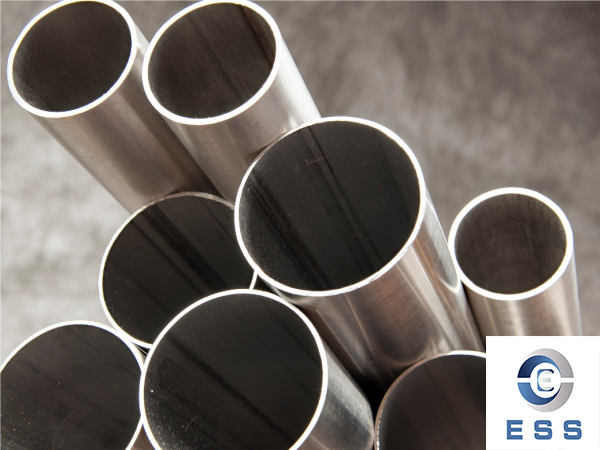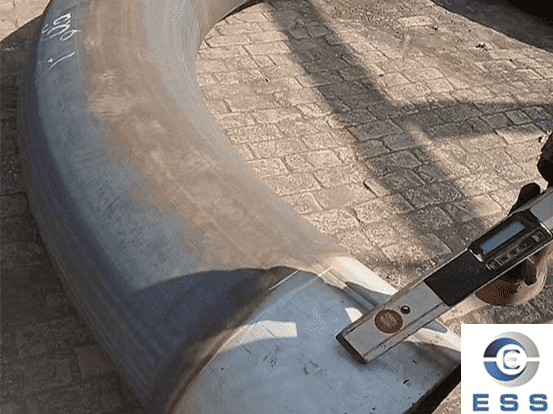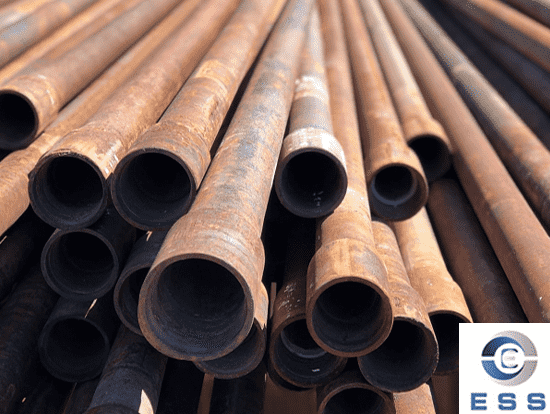Why do seamless steel pipes need anti-corrosion?
Why do steel pipes need to be anti-corrosion? As the name suggests, steel pipe anti-corrosion is to prevent steel pipes from corroding and reducing their service life. In PE anti-corrosion steel pipe processing and transportation of oil, water, natural gas and other pipeline projects, steel pipes are used as economic transmission materials. However, the material and chemical elements of some steel pipes determine that they do not have long-term corrosion resistance, thus greatly shortening the service life. , whether it is buried underground or elevated, we will face this problem. So, how to solve this problem? Later, people invented a method of coating the outer or inner walls of steel pipes to effectively control and prevent steel pipe corrosion.

This article will introduce to you which coating should be used for anti-corrosion of different steel pipes. At present, the main anti-corrosion coatings for steel pipes include:
1.Grease paint
Oil paint is a paint that uses dry oil as the main film-forming material. It is characterized by easy production, good brushability, good wettability, low price, and flexible paint film; however, the paint film dries slowly, is soft, has poor mechanical properties, has poor acid and alkali resistance, poor water resistance, and poor resistance to organic solvents. Dry oil is usually combined with anti-rust pigments to form anti-rust paint, which is used in atmospheric environments and has low corrosion resistance.
2.National paint
National lacquer, also known as raw lacquer and lacquer, is unique to China. Raw lacquer is a milky white viscous liquid produced by cutting the bark of the lacquer tree and filtering it to remove impurities. After raw lacquer is applied to the surface of an object, the color quickly changes from white to red, and from red to purple. If it takes a long time, it can turn into a hard and bright black paint film. Urushiol is the main component of raw lacquer, with a content of 30-70% (the higher the urushiol content, the better the quality of the raw lacquer). National paint has strong adhesion, tough paint film, good gloss, soil corrosion resistance, water resistance and oil resistance. The disadvantage is that it is toxic and can easily cause skin allergies. In addition, it is not resistant to strong oxidants and has poor alkali resistance.
3.Phenolic resin coating
It mainly includes alcohol-soluble phenolic resin, modified phenolic resin, pure phenolic resin, etc. Alcohol-soluble phenolic resin coating has good corrosion resistance, but its disadvantages are inconvenient construction, poor flexibility, and weak adhesion, so its application is limited to a certain extent. Phenolic resin needs to be modified during use. For example, rosin-modified phenolic resin and tung oil are refined, various pigments are added, and various magnetic coatings can be made after grinding. The paint film is tough and cheap, and is widely used in painting furniture, doors and windows. Pure phenolic resin coating has strong adhesion, water resistance, moisture resistance, heat resistance, corrosion resistance and good weather resistance.
4.Epoxy resin coating
Epoxy coatings have good adhesion to metal, concrete, wood, glass and other materials, good alkali resistance, and good insulation properties. The disadvantage is poor aging resistance. Epoxy anticorrosive coatings usually consist of epoxy resin and curing agent. The nature of the curing agent also affects the performance of the paint film. Epoxy resin coating is a one-component coating system that uses epoxy resin as a film-forming material. Epoxy resin consists of epoxy resin and vegetable oil fatty acid esters. Compared with general epoxy coatings, this coating has the advantages of low cost and poor alkali resistance. Commonly used in various metal primers in chemical plants and anti-corrosion coatings for outdoor equipment.
5.Polyurethane coating
Polyurethane resins used in anti-corrosion coatings usually contain two components: isocyanate-NCO and hydroxyl groups. Polyurethane (polyurethane) is a two-component product that is mixed and reacted to cure during use.
Polyurethane coatings have the characteristics of good physical and mechanical properties, hard, flexible, bright, full paint film, wear resistance, strong adhesion, corrosion resistance, resistance to oil, acid, chemicals, industrial waste gas, etc. The alkali resistance is slightly lower than that of epoxy coating; the aging resistance is better than that of epoxy coating, and it is often used as topcoat or primer; polyurethane resin can be mixed with various resins, and the formula can be widely adjusted to meet various usage requirements; It can be cured at room temperature or heated, and can also be cured at low temperatures (0°C); polyisocyanate components have poor storage stability and must be isolated from moisture to avoid freezing. Polyurethane coatings are expensive and have a long service life.
6.Long fiber wound fiberglass reinforced epoxy lining
A unique embedded lining process is used to form corrosion-resistant material in the steel pipe. This corrosion-resistant material can isolate oilfield corrosive liquids and gases from steel pipes, providing an internal anti-corrosion lining system for oilfield steel pipes and pipelines. Damaged downhole production tubing or subsea flow lines can be very costly to replace. It can provide good corrosion resistance protection in very harsh environments, which is unmatched by other products.
7.Polyethylene, polypropylene resin coating
Polyethylene resin anticorrosive coating is a film-forming coating made of monomer resin. Polyethylene coatings have been widely produced and used.
Polyethylene pipes have strong anti-corrosion and sealing properties, high mechanical strength, strong waterproofing, stable quality, convenient construction, good applicability, and do not pollute the environment. PE has low water absorption (less than 0.01%), high epoxy strength, low water absorption of PE, good hot melt adhesive softness, and high anti-corrosion reliability. The disadvantage is that the cost is higher than other repair materials. The raw materials of this coating are rich in sources and have been widely used in corrosion.
8.Furan resin coating
Furan resin coatings are resistant to various non-oxidizing inorganic acids, electrolyte solutions, and various organic solvents. They also have outstanding alkali resistance, but their oxidation resistance is not good. Furan resin series anti-corrosion coatings include furfuryl alcohol coatings, furfural acetone formaldehyde coatings and modified furan resin coatings.
9.Rubber coating
Rubber anti-corrosion coating is made from chemically treated or mechanically processed natural rubber or synthetic rubber, with solvents, fillers, pigments, catalysts, etc. added.
10.Asphalt coating
Asphalt is one of the important anti-corrosion coatings. In particular, coal tar pitch is the best. Coal tar pitch coating is inexpensive and has the advantages of water resistance. After being immersed in water for ten years, its water absorption rate is only 0.1% - 0.2%; it is resistant to erosion by some chemical media; it still has good wettability to the steel surface that has not been completely rusted; its solid content is high, and thick films can be obtained ; Low price. Its disadvantage is that it is crispy in winter and soft in summer. After exposure, some components volatilize and escape, causing the paint film to crack. These shortcomings can be improved by adding some other resins. For example, adding chlorinated rubber can improve the dryness of asphalt coatings and improve the shortcomings of being brittle in winter and soft in summer; epoxy asphalt coatings made of epoxy resin have the advantages of asphalt coatings and epoxy coatings, and have achieved very satisfactory results in anti-corrosion Effect. Asphalt coatings have been used in container bottoms, ship bottoms, dock gates, cofferdams, etc., and have good anti-corrosion effects.
11.Heavy anti-corrosion coating
Heavy-duty anti-corrosion coatings are compared to ordinary anti-corrosion coatings. It refers to an anti-corrosion coating whose anti-corrosion effect is several times higher than that of ordinary corrosive coatings under severe corrosive conditions. It is characterized by excellent resistance to corrosive media, outstanding durability, and a service life of more than several years. Mainly used in marine structures and chemical equipment, storage tanks and pipelines.
Read more: Difference between seamless pipe and seam pipe













 Eastern Steel Manufacturing Co.,Ltd not only improve product production and sales services, but also provide additional value-added services. As long as you need, we can complete your specific needs together.
Eastern Steel Manufacturing Co.,Ltd not only improve product production and sales services, but also provide additional value-added services. As long as you need, we can complete your specific needs together.










